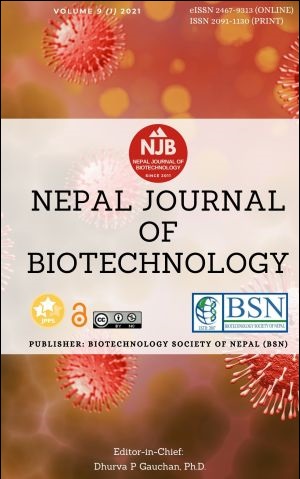Advances in Agricultural Biotechnology
DOI:
https://doi.org/10.3126/njb.v9i1.38643Keywords:
Agricultural biotechnology, genetic engineering, transgenic organisms, benefits, concernsAbstract
Agricultural biotechnology is becoming the major sector in crop improvement through the use of scientific techniques for the modification of genes conferring resistance to biotic, abiotic stress and improving the quality of crops. With the evolvement from Mendelian genetics to molecular biotechnology, there have been several developments in the field of crop improvement. Recent biotechnological advances have aimed towards removing the physiological constraints of the crops and increasing crop yield potential. With the use of different tools of agricultural biotechnologies like genetic engineering, tissue culture, embryo rescue, somatic hybridization, molecular marker-assisted selection, genome doubling, and omics technologies, various transgenic crops have been developed over the decades and have been approved for commercialization. This development and adoption of transgenic technology have been shown to increase crop yields, reduce CO2 emission, reduce pesticide and insecticide use and decrease the costs of crop production. Even though the biotechnological approach and transgenic organisms have immense potential to contribute to the world’s food security, several concerns of genetically modified crops being a threat to the environment and human health have developed. This review will address applications and concerns of biotechnology in crop improvement considering health hazards and ecological risks.
Downloads
Downloads
Published
How to Cite
Issue
Section
License
Copyright (c) 2021 Biotechnology Society of Nepal

This work is licensed under a Creative Commons Attribution-NonCommercial 4.0 International License.
Copyright Notice:
The manuscript submitted to NJB must be an original contribution, not previously published and should not be under consideration for publication elsewhere. When the manuscript is accepted for publication, the authors agree to automatically transfer the copyright of the article to the publisher. It should grant permission to any third party, in advance and in perpetuity, the right to use, reproduce or disseminate your article, according to the NJB copyright and license agreement.
Authors transfer copyright to the publisher as part of a journal publishing agreement but have the rights to: Share their article for Personal Use, Internal Institutional Use and Scholarly Sharing purposes, with the NJB applies the Creative Commons Attribution-NonCommercial CC BY-NC license to all the works we publish after Jun 2020 (Before it was CC BY-NC-ND). Under this license, authors agree to make articles legally available for reuse, without permission or fees, for virtually any non-commercial purpose. Anyone may remix, adapt, and build upon your work non-commercially, and although their new works must also acknowledge you and be non-commercial, they don’t have to license their derivative works on the same terms. More details on CC BY-NC refer to its Licence Deed and Legal Code.






